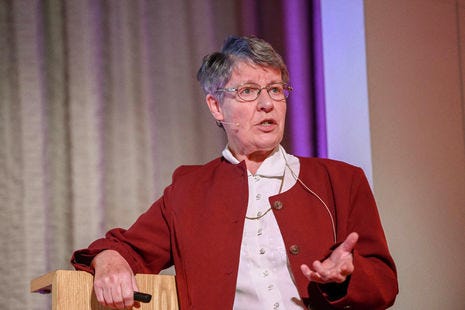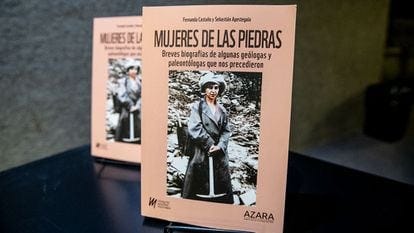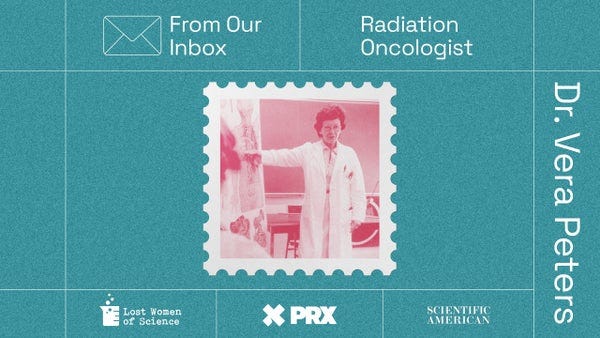Issue 9: Women of Science Jan '24
News, research, reviews, recommendations & an essay on the challenges faced by women scientists in 2024
Welcome back to Women of Science, featuring all the best happenings re: women of science every week 🧬
🔬 What to expect?
All subscribers receive the free edition covering weekly highlights in media, awards and discovery as well as things to read, see and watch re: women in science. Drops every Tuesday. Tell your friends:
Thank you for joining. Enjoy the read.
A quick run-down of this issue:
Abstract & Intro: News and updates on all things women of science
Materials, Methods, Discussion: An essay on challenges faced by women scientists in 2024
Conclusions & Further Reading: Reccos, reads & links this week Abstract & Intro
🗣️ Headlines, news & media snippets re: women of science this week
Part of a thinning generation of Silicon Valley female leaders, Sandberg had already stepped down as chief operating officer of Meta in 2022 after more than 14 years in the role. She now plans to leave the Meta board completely.
📌 Chemistry: 'That's a huge amount of movement for a single mammoth': Woolly female's steps retraced based on chemistry of 14,000-year-old tusk
A new analysis of a 14,000-year-old woolly mammoth tusk has pieced together the life of a female mammoth that likely died at the hands of hunters close to Alaska's oldest archaeological site.
📌 Health: Life expectancy gap between men and women is closing worldwide
The life expectancies of men around the world are catching up with women's longer lifespans, attributed to a possible decline in smoking and alcohol-related deaths.
📌 Health: Most expectant mothers miss out on vitamins important for their health and their baby’s, study finds
A study of over 1,700 women aged 18-38 in the UK, Singapore and New Zealand has revealed that nine in ten had low blood levels of many important vitamins, including folic acid, riboflavin, vitamin B12 and vitamin D, essential to support the health during pregnancy.
The Qvin menstrual pad comes designed with a removable strip indicated to help carry out diabetes tests based on blood samples has been granted clearance by the US Food and Drug Administration (FDA).
The leading pharma services business, has acquired Vinehealth, a women-founded patient app and physician support platform used by both patients and physicians alike, for an as-yet undisclosed sum…
& in other brief news:
🧭 Men are better at navigating than women - but not because of evolution
👩👩👧👧 Closing the women’s health gap: A $1 trillion opportunity to improve lives and economies from McKinsey’s Health Institute
Materials, Methods, Discussion
An op-ed on challenges faced by women academics in 2024

In the ever-evolving landscape of academia, women in the early stages of their scientific careers (but invariably applicable to those in a range of other fields) find themselves facing a myriad of challenges: Traversing the academic journey, being confronted with both the triumphs and tribulations that shape complex professional trajectories. Drawing from insightful interviews and reflections gathered from fellow women academics, as highlighted in the recent Nature article titled "Challenges for Women in Science: The Early Career Reality", their shared experiences increasingly forge a narrative of resilience and determination. But this is also by no means a new phenomenon.
One of the recurrent themes I often encounter in conversation with my STEM friends and colleagues is the persistent gender disparity that continues to cast its shadow across academic spheres. While strides have been made to bridge the gap, women in the early stages of their careers still find themselves navigating a labyrinthine structure, and the importance of fostering a sense of solidarity becomes increasingly apparent: While the aforementioned Nature article underscores the issue of limited representation of women in leadership roles within academia, the scarcity of female mentors and role models can additionally create a sense of isolation, making it essential for us to actively cultivate mentorship networks. But to which end, and through connecting with experienced women academics who have weathered similar storms, they in turn can glean valuable insights and support.
Moreover, the balancing act between professional aspirations and personal responsibilities is a tightrope walk familiar to many: The demands of academia often clash with societal expectations regarding family responsibilities, putting additional pressure on women.
The need for policies that facilitate work-life integration is not just a personal concern, but a collective one.
It is a call for systemic changes that reflect the diversity of experiences within the academic community - a collective advocacy for policies that promote equal opportunities, fair evaluation, and transparent promotion criteria is essential.
Networking, both within and outside our immediate academic circles, also emerges as a recurring theme in our shared experiences. As we navigate this complex terrain, our collective strength lies in our shared narratives, communal values, and a united front against systemic obstacles. The path ahead may be arduous, but by forging bonds of solidarity and advocating for change as a cohesive unit, we can aspire to create an academia that is truly inclusive and equitable for all.
Conclusions & Further Reading
More links & signposts for you to enjoy this week…
Publication of the week
Digital automation of transdermal drug delivery with high spatiotemporal resolution
Scientists have created a new drug delivery system that can receive commands wirelessly from a smartphone or computer to schedule and trigger the release of drugs from individual microneedles. The patch's thin, soft platform was designed to enhance user comfort and convenience for chronically ill patients.
The research team, led by a female team under PI Juan Song, PhD, professor of pharmacology at the UNC School of Medicine, and Wubin Bai, PhD, assistant professor of applied physical sciences at the UNC College of Arts and Sciences, tested the SOP in a mouse model, using melatonin in the microneedles to improve sleep.
Why is this useful? This work opens the door to researching this wirelessly controlled patch to deliver on-demand treatments for neurodegenerative disorders, including Alzheimer's disease. Patients could wear more than one patch at a time which would reduce the need for doctors' visits, or even trips to the hospital, for medical attention.
Books & review articles:
👩💻 I Was (Briefly) a Woman in Tech. It Sucked: Zulie Rane shares her experiences fresh out of college into the corporate tech world on her Medium blog.
💻 $2bn woman: how Sheryl Sandberg became one of tech’s most successful bosses: Given our news link above, this article sheds light on the woman behind the story - once considered so critical to Facebook’s success that her exit was seen as potential risk to investors’ money.
🔧 ‘Women in greasy overalls’: the drive to lure girls into engineering, 1971: The rewards could be considerable, including a scarlet Ford Capri, but only a very few technology workers were female (has much changed, we wonder?)
🦖 The forgotten women scientists who studied dinosaurs and rocks: A book recovers the biographies of over 170 female paleontologists and geologists from around the world, from the beginning of these disciplines through today.
Interview of the week:

Anouk Waller-Sargent of Varsity spoke to Dame Jocelyn Bell Burnell, a female astrophysicist who attended Murray Edwards College Cambridge, discussing her Nobel prize controversy, imposter syndrome, and life as a woman in STEM in the 1960s.
Podcast of the week:
This Doctor Helped Spare Women from Radical Mastectomy: Canadian radiation oncologist Vera Peters pioneered the use of lumpectomies and postoperative radiation to treat breast cancer patients, having begun her career studying treatment for Hodgkin’s lymphoma. Peters used techniques that had seen positive outcomes for Hodgkin’s to treat breast cancer patients; her life, impact and career being discussed extensively in this podcast episode from Scientific American.
Out and about this week:
A new era for endometrial cancer: Treatment advances transforming care:
Register today to hear from Andreia Fernandes, Lead Nurse for Gynae-Oncology at The Royal Marsden NHS Foundation Trust, about 'The emerging supportive needs of women with endometrial cancer.' You will also hear updates on staging, pathology and molecular testing, surgery, radiotherapy and drug treatments, the integration of innovative treatment modalities, and more.
📍 The Royal Society of Medicine, London: 25 January 2024
That’s all for this week!
Thank you for reading: The WoS mission is to support, share and promote the innovative and groundbreaking work that has been and continues to be done by women across all scientific disciplines, and to empower and inspire the next generation of female leaders in the field.
If you liked it, here’s another reminder to share us with your friends, network, neighbours, coffee baristas ☕ etc.:
Over the coming months, the WoS community will also be adding to its repertoire of channels for sharing content, so watch this space!










